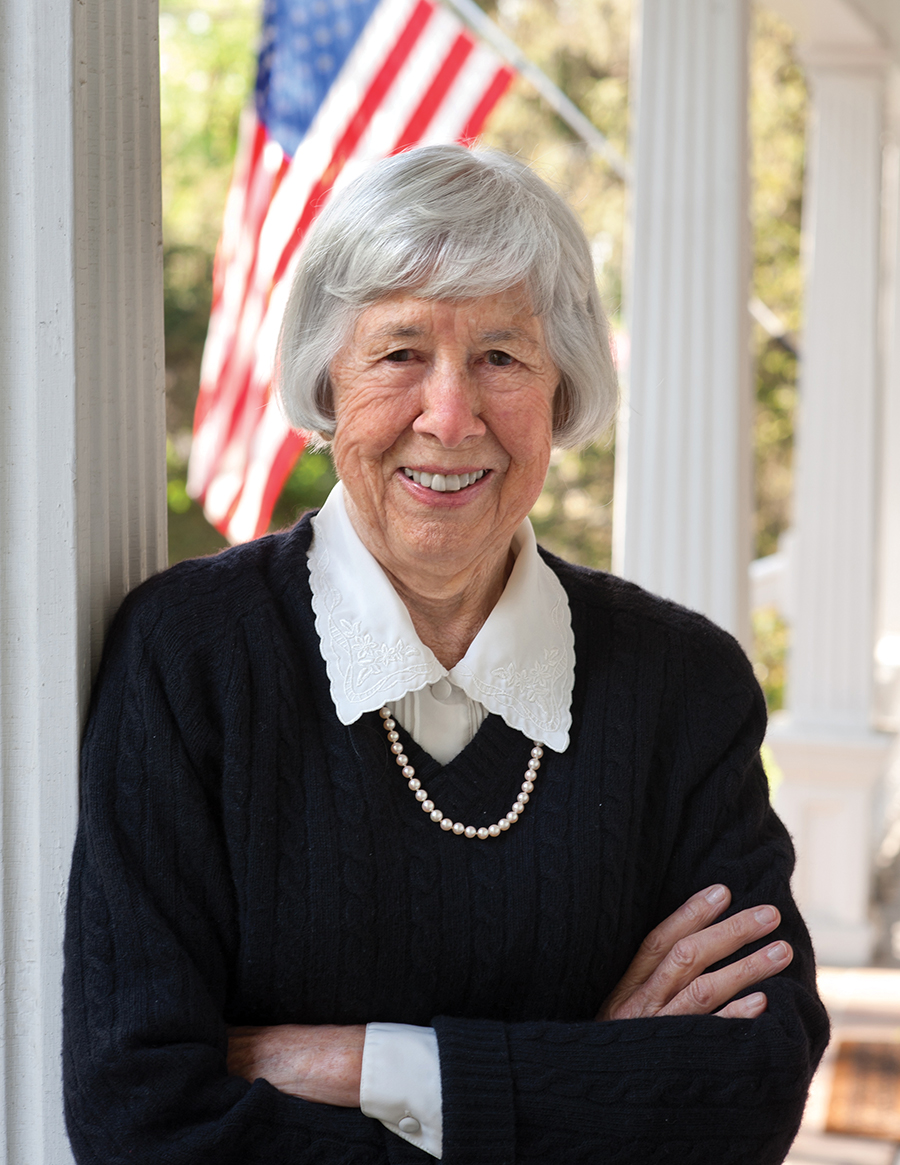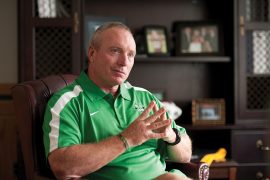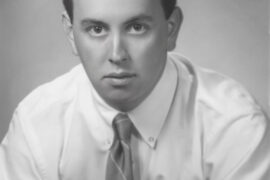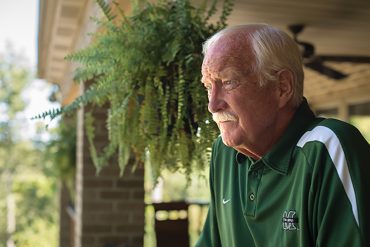Dr. Ruth Sullivan is a nationally acclaimed pioneer in the field of autism education and awareness.
By Carter Taylor Seaton
HQ 79 | AUTUMN 2012
Upon first meeting Ruth Sullivan, you might think she’s a typical grandmother. At 88, her diminutive frame, silver hair and sparkling smile certainly allow such an assumption. But you’d be wrong. While she is a grandmother, Dr. Ruth Christ Sullivan is anything but typical. This champion for autism awareness has been described as a born leader, a bulldog, tenacious, determined, inspiring, world-renowned, iconic and driven.
“When she wants something for people on the autism spectrum, or she thinks they have been wronged, she will go after the right people in the right way,” says long-time colleague Dr. Jim Ball, chairman of the National Board of Directors of the Autism Society of America. “But she’s relentless.”
Yet all these descriptors came about because of her early role as the mother of an autistic son. Joe Sullivan – the fifth of her seven children – was diagnosed with autism at the age of 3. Ruth, a public health nurse and former Army nurse, had never seen such a thing, despite two degrees, one in public health and the other in child development from Columbia University. After receiving the news, Ruth began looking for help for Joe. She found none. When the family moved from her hometown of Lake Charles, La., to upstate New York near Albany, she started over. Three more pediatricians gave the same diagnosis and agreed there was no curative treatment. At the time, the cause was thought to be unloving, uncaring, cold mothers – but Ruth knew none of that was true. She decided to do something.
First, she organized mothers who had come to a therapy session for “refrigerator mothers,” as they were dubbed. They had come to learn how to become better parents. Once organized, the mothers never returned to therapy. Instead, they petitioned the New York state legislature to include schooling for autistic children.
In 1965, Ruth also contacted Dr. Bernard Rimland, the author of one of the first books in the U.S. on autism, who suggested meeting with Ruth and other parents and professionals who had contacted him. At the meeting, they agreed to his proposal for a national organization, which then became the Autism Society of America (ASA). Now 155 chapters strong with 35,000 members, the advocacy organization works to educate the public about the spectrum disorder. In 1969, Ruth became its first elected president.
The Sullivan family moved to Huntington the same year. Bill Sullivan accepted a teaching position at Marshall University after Ruth learned the Cabell County school system had a class for autistic children at Oley Elementary. She believes it was the first in the country. Again, Ruth began to organize local parents and started the Huntington Autism Society, which eventually became the Autism Society West Virginia Chapter. For the next 10 years, she worked tirelessly to raise national autism awareness and to gain educational opportunities and services for children with autism. The list of her accomplishments during that period is astounding:
- She was the first lobbyist to bring autism issues to the state legislatures of New York and West Virginia.
- She was the first lobbyist for autism issues at the United States Congress and was instrumental in the passage of the national Individuals with Disabilities Education Act in 1975, guaranteeing free education to all children with disabilities, including autism.
- She operated the National Autism Hotline out of her home for five years.
- She founded several state and local chapters of the Autism Society of America.
- She served on the board of the ASA for four years, and she is still an honorary board member.
Despite these achievements, in 1978 Ruth realized that in order to be taken seriously, she needed a doctoral degree. In the midst of a busy career and as the mother of seven, she commuted 90 minutes to Ohio University for six years. At the age of 60, she received her Ph.D. with three emphases: psychology, special education and speech and hearing. She says it paid off.
As Joe became a teenager, Ruth turned her attention to what would happen to autistic children when they became adults or when parents could no longer care for them. Knowing that the National Autism Society was on solid ground, she turned her attention to creating an agency to provide services, including around-the-clock staff, for adults with autism. She began working from her dining room table with one employee and in 1979 founded Huntington’s Autism Services Center (ASC) and became its executive director. Today, the licensed behavioral health care agency provides services, as Ruth says, “from diagnosis to death,” to hundreds of families in Cabell, Wayne and Mason counties and operates more than a dozen group homes. Joe, now 52, lives in the first home the agency purchased in 1979.

Next, Ruth realized that while classes for autistic children now existed in the school system, there was no training available for teachers who wished to work in this challenging field. Soon she was looking for money to start a specialized training program at Marshall University. According to Elaine Harvey, president of the local chapter of the Autism Society and mother of an autistic son, Ruth organized a breakfast for legislators whose support she hoped to elicit. She arranged the seating so that each legislator was seated with an autistic child on one side and a parent on the other. Mission accomplished. In 1983, with the strong support of Senator Bobby Nelson, then-chair of the Senate Committee on Finance, the West Virginia legislature established the WV-Autism Training Center (WV-ATC) at Marshall University. Since then, more than 2,500 families have registered for services from the center.
She didn’t stop there. During her tenure as executive director of the Autism Services Center, Ruth also founded the National Association of Residential Providers for Adults. She is the author of five books and more than 65 articles on autism. Serving as an editor of the Journal of Autism and Developmental Disorders from 1977-1986, she also reviewed books and films on the subject. In 1994, Ruth assisted in founding the National Autism Society of Argentina and has spoken or consulted on autism in France, Ireland, Mexico, Canada, Australia, New Zealand, Kuwait, Argentina, Namibia, Gabon and South Africa.
Despite her numerous accomplishments, Ruth says that the Academy Award-winning film Rainman did for autism in one movie what it had taken her and all who worked with her 25 years to do. She says the awareness of autism took a quantum leap forward when director Barry Levinson and film star Dustin Hoffman put a face to the disorder. Ruth served as a consultant for the movie, which also starred Tom Cruise; however, the role came at a very stressful time.
After opening Huntington’s first group home in 1979, hiring staff and feeling like things were under control, Ruth had embarked on a much-needed vacation with instructions that she not be called unless it was very important. Upon landing in Los Angeles, her sister, with whom she was visiting, said, “Call your office.” Ruth groaned until she discovered that Dustin Hoffman’s office had called to ask if Ruth had time to meet with Hoffman while she was in California. “You know, I made time to see him,” she laughs. Hoffman sent a car to her sister’s home and drove her to what she called a very unimpressive office where she met with Hoffman and Levinson.

As the filming neared the end, Ruth was again in Hoffman’s office. As they were leaving, she said, “How about having the premiere in Huntington?” Hoffman thought it was a good idea but had to convince Levinson and the producers. A few weeks later, Ruth got the call confirming the premiere. Despite stories to the contrary, Hoffman did not meet Joe Sullivan until the night of the premiere when he positioned himself behind the Sullivans. He wanted to watch Joe’s reaction to the movie. Later, when he asked Joe what he liked, Joe responded, “I liked the part where he counted the toothpicks.” According to Ruth, that pleased Hoffman.
The movie’s world premiere, held in Huntington, benefited the ASC by helping to pay for that first group home.
Ruth retired in 2007, although she admits she’s still connected within the field. When Mike Grady, who had worked for her for more than 20 years, stepped in as the new executive director of the Autism Services Center, he told her, “One of my goals is to be sure we make you proud.” Four and a half years later, Mike says they still have a wonderful relationship.
Dr. Steve Edelson, director of the Autism Research Institute of San Diego, calls Ruth one of the true pioneers in the field of autism. While Ruth deserves all the accolades she’s received, she says she’s the most pleased about the worldwide publicity her efforts created.
“The media loved writing about autism because these are interesting human beings who have remarkable skills,” she reflects. “They saw what great stories there were.”
Still, she has one more goal.
“I hope I live long enough, and they can work quickly enough, for me to know what causes autism,” she says.
Apparently, the term “refrigerator mother” still haunts.





